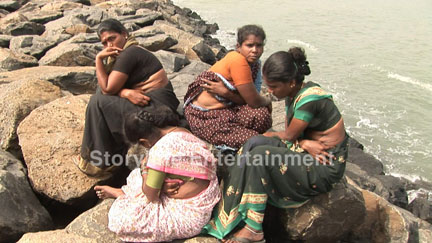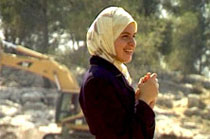Tag : Elizabeth Mandel
January 3, 2011 by Elizabeth Mandel
Feminists In Focus: The Market For Organ Trade
 I recently returned from the International Documentary Film Festival Amsterdam, Europe’s premier documentary film festival. It seemed apt, in a city infamous for its offering of everything for sale, to see Rama Rau’s “The Market,” the story of Sandra, a Canadian single mother desperately in need of a kidney, and the residents of a slum on the outskirts of Chennai, India, who are offering their kidneys for sale.
I recently returned from the International Documentary Film Festival Amsterdam, Europe’s premier documentary film festival. It seemed apt, in a city infamous for its offering of everything for sale, to see Rama Rau’s “The Market,” the story of Sandra, a Canadian single mother desperately in need of a kidney, and the residents of a slum on the outskirts of Chennai, India, who are offering their kidneys for sale.
I intentionally avoided writing “the residents…who are willing to sell,” because “The Market” skillfully raises and explores the question of what “willing” means, when there are no choices. For the people — primarily women — of Villivakkam, the commodification of their bodies is their only option; they must sell off the one thing they possess in order to keep themselves and their families alive. This question has been often explored in relation to sex work: when a woman, lacking opportunity, education, status and access to resources “chooses” prostitution, is it really a choice? In the words of one of the men who has sold his kidney, “We are fishermen by birth, we used to sell parts of the fish in the market but now we cut and sell parts of ourselves. They have made us the market.” (more…)
- 2 Comments
November 1, 2010 by Elizabeth Mandel
Feminists in Focus: A Peaceful Middle East
Welcome to the latest installment of “Feminists in Focus: Film News and Reviews,” an incisive look at the new film, Budrus, from filmmaker and Lilith contributor Elizabeth Mandel. Enjoy!
 The media is replete with violent images of Palestinians, Israelis and Muslims; of veiled Muslim women subjected to the will of the men in their lives; of a sense of hopelessness regarding the Israeli-Palestinian conflict. The recent documentary film “Budrus,” directed by Julia Bacha, offers an alternative version to this story, and through that, hope for an alternative vision for the future. The film chronicles the events that unfolded in Budrus, a tiny (pop. 1500) Palestinian village on the West Bank, as the residents came together in nonviolent resistance against Israel’s separation barrier cutting through the village, its cemetery and its life-sustaining olive groves.
The media is replete with violent images of Palestinians, Israelis and Muslims; of veiled Muslim women subjected to the will of the men in their lives; of a sense of hopelessness regarding the Israeli-Palestinian conflict. The recent documentary film “Budrus,” directed by Julia Bacha, offers an alternative version to this story, and through that, hope for an alternative vision for the future. The film chronicles the events that unfolded in Budrus, a tiny (pop. 1500) Palestinian village on the West Bank, as the residents came together in nonviolent resistance against Israel’s separation barrier cutting through the village, its cemetery and its life-sustaining olive groves.
 In 2004, the construction of the barrier came to Budrus. It was scheduled to cut through the town, ostensibly unavoidably, for security reasons (no concrete reason is given for why the barrier takes a circuitous path that cuts through and isolates villages from their land and each other). In response, Ayed Morrar, a lifelong activist and six-year-veteran of Israeli prison, organizes “the Popular Committee Against the Wall,” a non-violent resistance movement designed to stop the progress of the barrier. At first it seems the protests are almost benignly endured by the Israeli military police assigned to Budrus. There is internal disagreement about whether the bulldozers should stop or continue. But soon, olive trees are being dug up, and it seems inevitable the protestors will be stopped and the barrier erected. (more…)
In 2004, the construction of the barrier came to Budrus. It was scheduled to cut through the town, ostensibly unavoidably, for security reasons (no concrete reason is given for why the barrier takes a circuitous path that cuts through and isolates villages from their land and each other). In response, Ayed Morrar, a lifelong activist and six-year-veteran of Israeli prison, organizes “the Popular Committee Against the Wall,” a non-violent resistance movement designed to stop the progress of the barrier. At first it seems the protests are almost benignly endured by the Israeli military police assigned to Budrus. There is internal disagreement about whether the bulldozers should stop or continue. But soon, olive trees are being dug up, and it seems inevitable the protestors will be stopped and the barrier erected. (more…)
- No Comments
 Please wait...
Please wait...